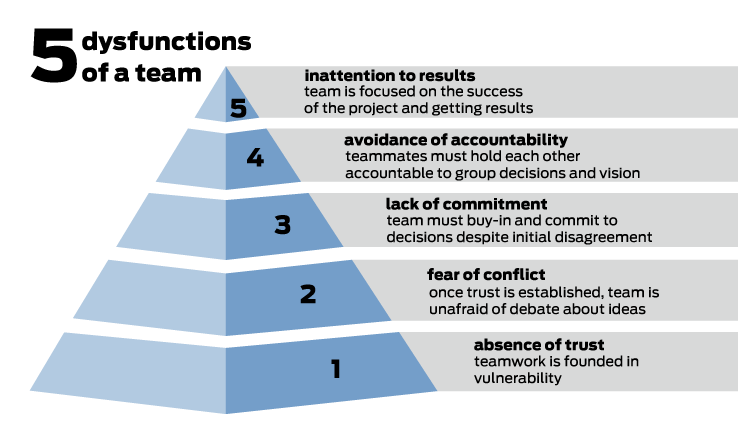Success Theater
Does your team’s culture emphasize success, or Success Theater?
Remember, no one’s as happy as they seem on Facebook, as depressed as they seem on Twitter or as insufferable as they seem on Instagram
- Maura Quint

Success Theater is when everyone projects a happy face all the time, regardless of how they feel. It breeds Imposter syndrome. It makes people unwilling to ask for help. It’s the most basic dysfunction of a team: absence of trust, caused by a fear of being vulnerable with team members.
 Image Credit: http://reesenewslab.org
Image Credit: http://reesenewslab.org
Trust comes from being vulnerable to another human being, from being brave enough to say “I need help.” The problem with the consulting business is that it’s overrun by macho thinking, where showing weakness is a sign of failure. You’re either going up, or you’re going out.
Actual conversation with a colleague:
Me: “Hey, good luck with the presentation!”
Him: “No luck, it’s all skill.” (walks off)
In a team setting, a lot of cues come from the leaders (elected or otherwise). If a leader is unwilling to express vulnerability, it trickles down to the team in destructive ways. First of all, it breeds a fear of failure. Second, it generates a Survivor Island mentality where someone else’s failure is my opportunity.
My first job out of school was at an amazing company. It was founded on great values and put a lot of emphasis on culture. But the ground reality was that it was a frat house. Everyone projected success all the time, and there was little acknowledgement or discussion of failure. I was young, brand new to the US and anxious to assimilate, and absorbed that culture thinking that it’s normal. I remember privately feeling that “people here have 2 faces - one for the public and one private”. I was unable to be honest with my bosses or peers about the fears and insecurity I felt all the time.
It took many years of struggle to be comfortable enough to admit weakness, to come to terms with my fear of failure.
I work at a place now where people are truly willing to be vulnerable. Last week we went through the Personal Histories exercise from the book The Five Dysfunctions of A Team. It was truly inspiring to see colleagues talk about how their childhood tribulations affected them and still affect them. It took courage from the speaker, and humility and empathy from the listeners to accept what is being said without judgment. We plan to continue following the book and going through the exercises as a group.
Something amazing happens when you really start trusting: the success theater goes away. You feel liberated. You can then start to pursue true success - whatever shape that may take for you.
